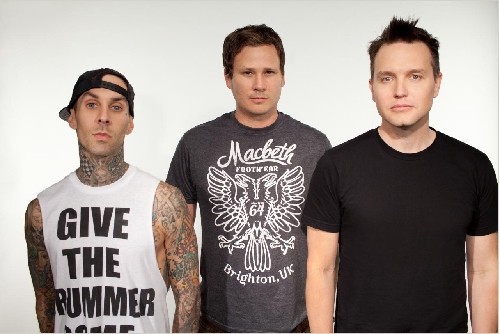As time has gone on, I’ve steadily realized I may not be alone in my undying love for pop-punk’s true golden child, blink-182.
Sure, there have been the naysayers who pull the “Green Day did it first” card, or perhaps discredit ‘90s pop-punk entirely (another “In Defense of Pop Music” in the waiting). But there will always be those who simply hold blink’s puerile stage personas and perpetually freshman-year lyrics against them, especially now that co-leaders Tom Delonge and Mark Hoppus have reunited as 40-year-olds who still bitch about being 23 and “growing up.”
But for the most part, blink-182 is doing all right these days. The band’s concert attendances are bigger than ever, and no matter how many people complain that its reunited output sullies whatever perfect track record they might have had before, those same people are buying and listening to the music all the same.
My mission these days is not to defend blink-182 as a band. Particularly for the college crowd, blink-182 is pretty well-defended as a solid, enjoyable group. No, instead my mission is far more important: I want to unequivocally defend blink-182 as one of my favorite bands of all time.
As anyone who writes about music must do, it’s important that I make the distinction up front about a band being “one of the best bands of all time” and “one of my favorites.” Sadly, I’m not sure I could make a sound case for blink being a perfect band for everyone. Yet there is something innately relatable for people like me about blink-182’s entire approach to musical style and content, specifically with their earlier work.
As a rule of thumb, anything that is fast and sounds like it has terrible production value is going to interest me, but more so than any other pop-punk band, blink-182 sounds weird and alienated with purpose.
Listen to songs like “M Ms” or “Toast and Bananas” from 1994’s Cheshire Cat and marvel at just how neurotic they sound, as if Hoppus and Delonge simply have never heard another way to communicate in their lives. The guitars are sharp and messy, the drums fall in and out of correct time, and both singers are yelling with all they’ve got about how confused they are with girls, with growing up, with doing damned near anything except making the exact kind of punk rock you’re listening to.
Take a good look at the band in those early days, and no matter how devilish their grins, it’s more than apparent they were the weird kids in school. Rightfully so, blink-182 has gotten a rap for singing about blowjobs and teenaged horniness, but those songs have always been scattered among songs like 1997’s “Dick Lips” or “Pathetic,” where the very eccentric sex jokes made them such a hit become punch lines for just how confused and lame they feel in everyday life.
I don’t mean to suggest that a song like “Depends,” a loving tribute to adult diapers, somehow takes on a preternatural degree of profundity just because the same guys who sang that penned a song as perfectly frustrated as Enema of the State opener “Dumpweed.” However, the key to blink as a band has always been as much in the serious tracks as the silly ones, and it’s the presence of both that make their first four records such treats.
This mix of goofball charm and honest rebellion had been tackled before, dating all the way back to bands like The Replacements and the Descendants who more or less invented the form blink rode to the forefront of the public consciousness. But at the time at which blink was doing it, no one could do it quite as easily or as well.
Outside of their lyrical resonance, blink-182 nails another key aspect of the musical experience necessary for widespread success these days: melody. There’s a reason that a three-chord song like “All The Small Things” became the massive hit that it did, and it’s as simple as the song having one of the catchiest damn melodies this side of “Call Me Maybe.”
It would be easy enough to pass blink by if you’re not the biggest fan of the band’s social misfit lyrics and an almost Freudian dedication to male genitalia, but how can you argue with a riff like the one in “What’s My Age Again?” or “First Date”?
Even when Delonge and Hoppus grew up and started writing songs like “I Miss You” and “Always” from 2003’s excellent blink-182, they never quite lost that attention to melody that made them so appealing in the first place. The band’s songwriters could possess all the pop-punk genius in the world, but if they couldn’t stick a melodic landing with a song like early favorite “Carousel,” it would all be for naught.
Plenty of bands have come and gone from the public sphere simply because they’re unable to write more than maybe one or two memorable songs. blink-182 on the other hand, has managed to stick around for 20 years and made enough fans and haters to ensure they’ll matter at least a while more. Not bad for a band who never quite grew up.









